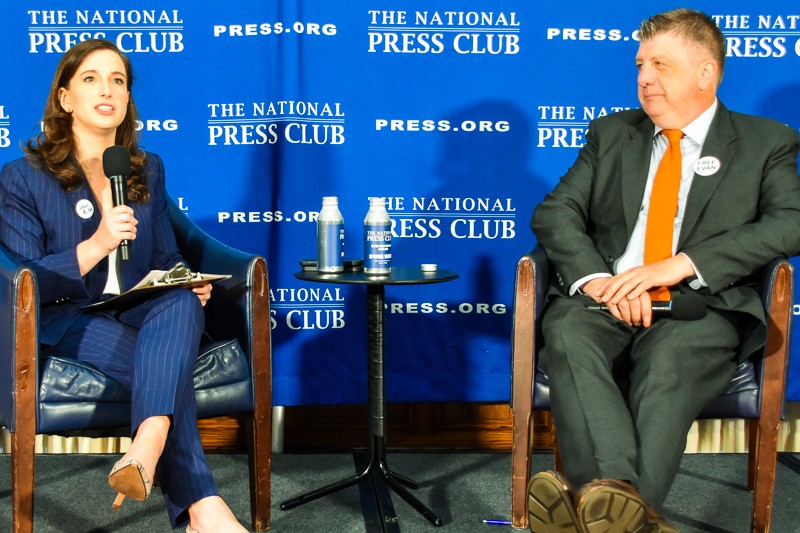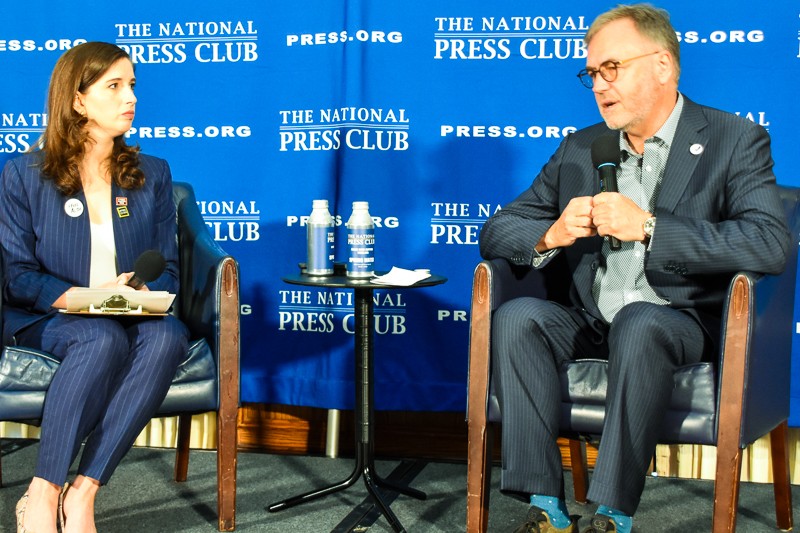World Press Freedom Day: Speakers call for release of Gershkovich, Tice, Kurmasheva
More journalists could be kidnapped, held or even killed, as was Daniel Pearl of The Wall Street Journal in Pakistan in 2002, not just by militants or terrorists but by actors in the highest levels of countries antagonistic to the United States, WSJ assistant editor Paul Beckett said at the National Press Club on Friday, May 3.
Beckett was among the speakers at the Club on World Press Freedom Day who discussed the imprisonment of three U.S. journalists – Austin Tice, a freelance reporter who has been held in Syria for more than 11 years and eight months; Evan Gershkovich, a Wall Street Journal reporter detained in Russia; and Alsu Kurmasheva, a Radio Free Europe reporter also being held in Russia.

Gershkovich, who has been detained for 14 months, is the first journalist working for a U.S. publication to be arrested on charges of spying in Russia since the Cold War, Beckett said.
“Now state actors are the most common party for detaining journalists,” Beckett said in an interview with Club President Emily Wilkins. “Are countries that stick up for freedom of the press adequately prepared for reporter oppression?”
Even in the United States, which is actively negotiating with Syria and Russia for the return of the three journalists, it is “very hard to navigate the U.S. government on these topics,” Beckett said. “Are our allies as prepared to deal with this? Deterrence is ultimately what we want.”
Tice: ‘We are not giving up’
Debra Tice, mother of Austin Tice, said she told President Joe Biden in a brief meeting with him on April 28 that it took the National Security Council 11 months to act on his “very distinct” May 2022 directive to get a meeting to listen to the Syrians “and find out what they wanted” in exchange for the release of her son, who was kidnapped in 2012 in Damascus.
The NSC “ignored the president’s directive,” Tice told Wilkins. It was an example of U.S. government efforts that have been “less than sincere” that she has witnessed over the nearly 12 years she has been campaigning for her son’s freedom.
The NSC’s “working relationship [with me] has been good,” Tice said. “They are very open to engagement with me, but what I really want is for them to engage with the Syrians.”

Tice maintains faith that her son will return home.
“We are not giving up,” she said. “I have no doubt. Austin is exceedingly eager to walk free.”
She said she wants to see “engagement, dialogue and a concession. This is how hostage situations work.”
Tice warned that a bill approved by the House of Representatives in February 2023 – the Assad Regime Anti-Normalization Act – would be a setback for her son. The measure calls for no engagement with Syria by the U.S. government, businesses or allies.
If the legislation passes the Senate it “would be a life sentence for Austin,” Tice said. A “U.S.-based Syrian lobby intent on keeping the 13-year civil war in Syria going” pushed for the bill, even though the conflict is over, Tice added.
“The U.S. government, the State Department and the Congress need to wake up,” Tice said. “The insistence that we cannot engage with Syria, and our government being in the middle of that, is the biggest obstacle” keeping her son behind bars, Tice said.
No justification for detentions
The common thread in the detention of each of the U.S. journalists is that there is no justification for their detentions, speakers said.
Kurmasheva, a dual U.S.-Russian citizen who lives in Prague, Czech Republic, and who has been imprisoned in Russia for seven months, was in Russia in May 2023 to care for her elderly mother.
She was detained the following month at Kazan airport by authorities for failing to register her U.S. passport with Russian authorities. She was held again in October 2023 for failing to declare herself a “foreign agent.”
“It almost doesn’t matter what the charges are, because none of them are just,” Stephen Capus, president of Radio Free Europe/Radio Liberty, told Wilkins.

RFE/RL’s strategy has been to partner with the Committee to Protect Journalists “to keep the spotlight on the case and raise its profile,” Capus said.
Besides daily updates on Kurmasheva’s health and well-being, the broadcaster is working to prompt the State Department to declare her wrongfully detained.
“The designation would afford the opportunity for Alsu to be visited in prison by U.S. officials and open up avenues of communication about her situation,” Capus said. “There is no justification for keeping a mother of two wonderful girls, and a loving wife, imprisoned.”
Gershkovich deadline
A looming and decisive deadline in Gershkovich’s case is June 30, which is the end of his pretrial period, Beckett said. At that point, Gershkovich will stand trial, and “from there, it is totally opaque. We fully expect him to be convicted. Once he is convicted, who knows?”
Uncertainty is another theme running through each journalist’s situation.
“We don’t know what type of machinery is at work to free Alsu, Austin and Evan,” Capus said.
Beckett, Capus and Tice said the best thing that fellow journalists, the Press Club and the public can do is to voice support for the release of the three wrongfully jailed reporters, which will add to the pressure for the U.S. government to take action.
